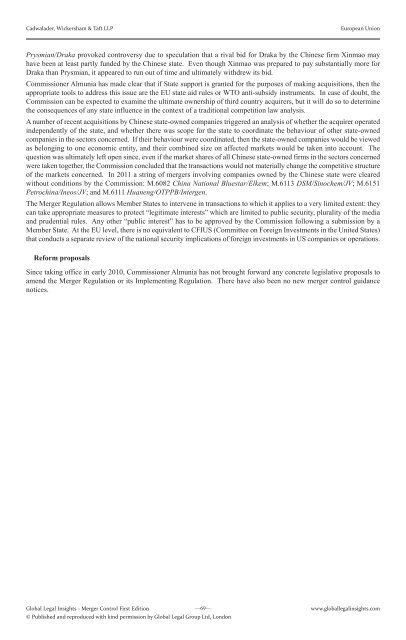Merger Controls First Edition - J Sagar Associates
Merger Controls First Edition - J Sagar Associates
Merger Controls First Edition - J Sagar Associates
You also want an ePaper? Increase the reach of your titles
YUMPU automatically turns print PDFs into web optimized ePapers that Google loves.
Cadwalader, Wickersham & Taft LLP European Union<br />
Prysmian/Draka provoked controversy due to speculation that a rival bid for Draka by the Chinese firm Xinmao may<br />
have been at least partly funded by the Chinese state. Even though Xinmao was prepared to pay substantially more for<br />
Draka than Prysmian, it appeared to run out of time and ultimately withdrew its bid.<br />
Commissioner Almunia has made clear that if State support is granted for the purposes of making acquisitions, then the<br />
appropriate tools to address this issue are the EU state aid rules or WTO anti-subsidy instruments. In case of doubt, the<br />
Commission can be expected to examine the ultimate ownership of third country acquirers, but it will do so to determine<br />
the consequences of any state influence in the context of a traditional competition law analysis.<br />
A number of recent acquisitions by Chinese state-owned companies triggered an analysis of whether the acquirer operated<br />
independently of the state, and whether there was scope for the state to coordinate the behaviour of other state-owned<br />
companies in the sectors concerned. If their behaviour were coordinated, then the state-owned companies would be viewed<br />
as belonging to one economic entity, and their combined size on affected markets would be taken into account. The<br />
question was ultimately left open since, even if the market shares of all Chinese state-owned firms in the sectors concerned<br />
were taken together, the Commission concluded that the transactions would not materially change the competitive structure<br />
of the markets concerned. In 2011 a string of mergers involving companies owned by the Chinese state were cleared<br />
without conditions by the Commission: M.6082 China National Bluestar/Elkem; M.6113 DSM/Sinochem/JV; M.6151<br />
Petrochina/Ineos/JV; and M.6111 Huaneng/OTPPB/Intergen.<br />
The <strong>Merger</strong> Regulation allows Member States to intervene in transactions to which it applies to a very limited extent: they<br />
can take appropriate measures to protect “legitimate interests” which are limited to public security, plurality of the media<br />
and prudential rules. Any other “public interest” has to be approved by the Commission following a submission by a<br />
Member State. At the EU level, there is no equivalent to CFIUS (Committee on Foreign Investments in the United States)<br />
that conducts a separate review of the national security implications of foreign investments in US companies or operations.<br />
Reform proposals<br />
Since taking office in early 2010, Commissioner Almunia has not brought forward any concrete legislative proposals to<br />
amend the <strong>Merger</strong> Regulation or its Implementing Regulation. There have also been no new merger control guidance<br />
notices.<br />
Global Legal Insights <strong>Merger</strong> Control <strong>First</strong> <strong>Edition</strong><br />
—69—<br />
© Published and reproduced with kind permission by Global Legal Group Ltd, London<br />
www.globallegalinsights.com


